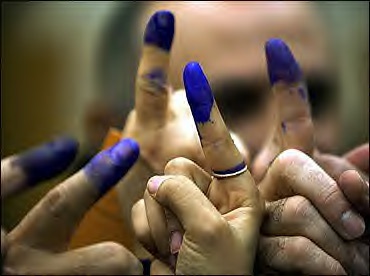Democracy is not a panacea – but with real commitment, it is a possible future

Last week’s Wall Street Journal ran a sobering piece by Bret Stephens in about the disappointing results of democratic elections the previous weekend. It’s true that democracy’s defenders have lately been mugged by reality.
On the other hand, Stephens gives a nod toward the end of the piece to the long view (“The good news is that Egyptians may have a wider conception of freedom in 30 years or so, about the same amount of time it took Khomeinism to lose the masses in Iran. In 30 years, too, the Greeks may have a better appreciation of the notion of responsibility, both personal and political.”)
At its heart, democracy is a system that requires optimism and faith in the ability of the masses of human beings to aspire and be responsible. To dismiss its superiority over that of, say, dictatorship, is to side with the lower elements of human nature over the higher ones.
Call me an idealist, but I believe in the big picture, to quote Dr. Martin Luther King, Jr. (who was quoting abolitionist Theodore Parker), “the arc of the moral universe is long but it bends towards justice.”
The moral advancement of the human race seems to move at a snail’s pace, with many glaring and dramatic setbacks. And yet, on the macro level, surely we have advanced from the days of commonplace child sacrifice and slavery and the days when women were universally regarded as lower in status and value than men, for instance.
To continue with an elaboration on Dr. King’s quotation by President Barack Obama (delivered in a speech in 2008): “It bends towards justice, but here is the thing: it does not bend on its own. It bends because each of us in our own ways put our hand on that arc and we bend it in the direction of justice….”
I think this insight can be applied to the global struggle toward democracy. For as policy-makers have learned, democracy building demands a great deal from the residents of any democracy itself. No matter how others are willing to sacrifice for a faraway people, those people themselves must take up democracy’s mantle with all the sacrifice, day-to-day work, education, and civic participation such a society requires. Democracies – whether in Egypt, in Greece, in Iraq, or here in the U.S. – will only be as healthy, vibrant, strong, and genuinely representative as the people who build and sustain them.
That said, we should be careful lest we jump from one erroneous conclusion (that democracies can be built quickly and ushered in primarily by outside forces) to another (that democracy is purely the province of the West and there is no hope for this system of government in any other part of the world, that no one in any place other than the U.S. or Europe wants, can handle, or will sacrifice for any kind of democracy).
As the shrewd Stephens is wise to note near the end of his piece, no one knows the future, and to conclude that the tumultuous events unfolding in places like Egypt and Greece presage the demise of democracy would be short-sighted. To that caveat I would add that I personally know numerous individuals within the Arab world who have taken huge risks and made harrowing sacrifices to try and build democracy in their countries. And let’s not forget that, whatever one’s views about the overthrow of Saddam Hussein and America’s subsequent Iraq policy, millions of Iraqi citizens risked their lives to vote in elections and put their lives on the line to join Iraq’s security forces. Reports of horrendous violence in present-day Iraq as well as of election fraud and corruption in Iraq’s present government should, while informing us about the messy and deeply flawed aftermath of U.S. policy in Iraq, not cause us to forget that many people of great goodwill, courage, and idealism – both American and Iraqi – made enormous sacrifices to bring democracy to the region.
To the extent the results have been uneven or worse, it is not the fault of those who sacrificed. And it is not necessarily proof that democracy cannot exist and flourish in the region. It may just be an indicator that U.S. policymakers gravely underestimated the challenges – such as highly effective sabotage from many terrorist forces in the region, including the Iranian regime. And it also may suggest that any democracy not fueled and sparked primarily from within will likely face challenges even greater than those birth pains that seem to accompany any nation’s emergence.
To jump from the realization that the U.S. should carefully consider its role –and its stomach for real, long term commitment–before militarily intervening to promote democracy to the conclusion that the U.S. has no role to play as a leader in promoting democracy or human rights around the world is a mistake.
For in so doing, we will be siding with those who would seize power – and subvert democracy – and against those who would make sacrifices and dedicate themselves to building a better, freer future for their children.
This entry was written by Heather Robinson and posted on June 19, 2012 at 2:09 pm and filed under Blog. permalink. Follow any comments here with the RSS feed for this post. Keywords: Arab-Jewish-relations, democracy, Egypt, human-rights, terrorism. Post a comment or leave a trackback: Trackback URL. */?>



